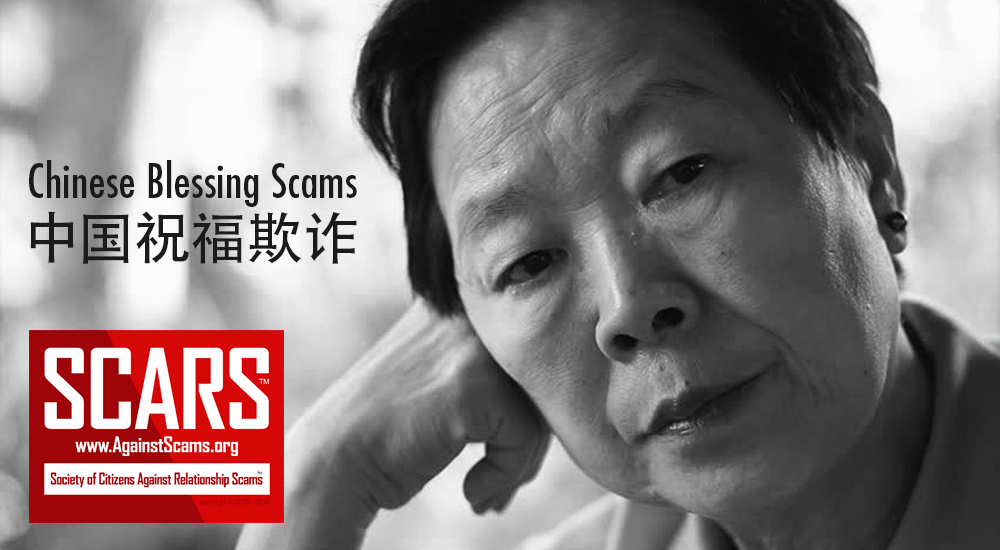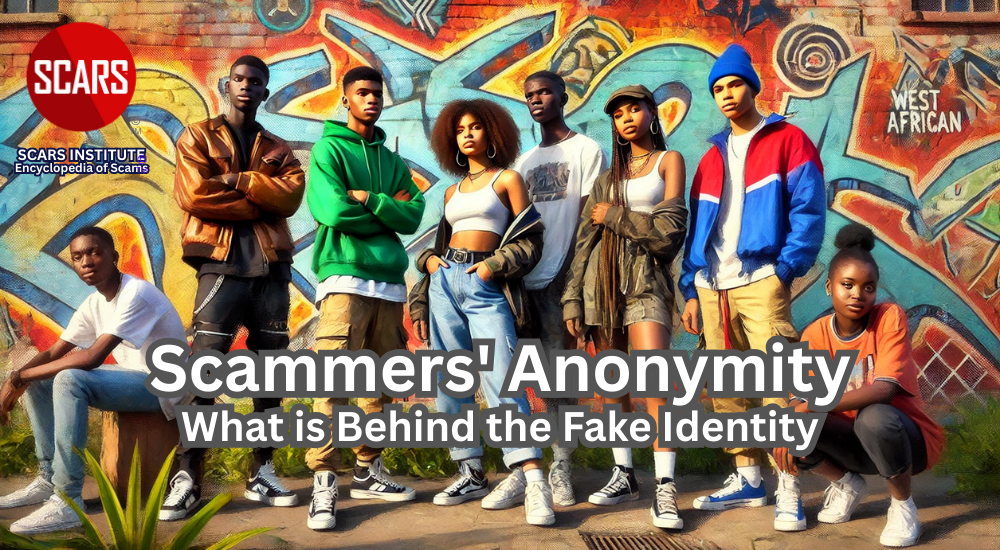
SCARS Institute’s Encyclopedia of Scams™ Published Continuously for 25 Years

SCARS™ Scam Warning: Chinese Blessing Scams 騙局警告:中國祝福騙局
The Blessing Scam Is Also Called The “Ghost Scam” Or “Jewelry Scam
祝福騙局也稱為“鬼騙局”或“珠寶騙局”
The blessing scam (also known as the “Ghost Scam” or “Jewelry Scam”) is a confidence trick typically perpetrated against elderly women of Chinese origin.
The scam originated in China and Hong Kong and victims have fallen for it worldwide including in Chinatowns and overseas Chinese communities.
The object of the scam is to persuade the victim to put valuables into a bag, which the perpetrator then secretly swaps for a different bag, enabling them to take the valuables.
祝福騙局(也稱為“幽靈騙局”或“珠寶騙局”)是一種針對中國血統的老年婦女的信心欺騙手段。
該騙局起源於中國大陸和香港,受害者在全世界範圍內都受到了打擊,包括唐人街和華僑社區。
騙局的目的是說服受害者將貴重物品放入一個袋子,然後肇事者秘密地換成另一個袋子,使他們能夠拿走貴重物品。
CHINESE BLESSING SCAMS
Operation of the Scam / 騙局的運作
The scam typically requires three people.
One approaches the victim and casually begins a conversation, introducing the topic of a certain healer, herbalist, traditional doctor or psychic. The second con artist, a shill, appears to coincidentally overhear the conversation and states that they know of and have been helped by the healer in — for example, that the healer cured their broken hand or healed their mother after a stroke. This provides social proof, lending credibility to the first con artist’s depiction of the healer’s powers.
騙局通常需要三個人。
一個人接近受害者,隨隨便便開始對話,介紹某種治療師,中醫師,傳統醫生或通靈師的話題。 第二位騙子,是一個騙子,似乎是偶然聽到了談話,並說他們知道治療者並得到了治療者的幫助-例如,治療者中風後治癒了他們受傷的手或治癒了母親。 這提供了社會證據,為第一位騙子對治療者力量的描繪提供了可信度。
The two then persuade the victim to visit the healer.
In some variants, they happen upon a relative of the healer who also is purported to have special powers; in others, they meet the healer himself. The healer then states that a ghost or spirit is following the victim and that a family member is in danger or some other ill is about to befall her. The healer offers to perform a blessing ritual to get rid of the evil spirits or ghosts.
The Blessing Ceremony requires the victim to put valuables in the bag, reflecting the common religious theme of needing to provide something of value in order to gain blessings. The victim is encouraged to put as much valuable content in the bag as possible. A prayer is then said over the bag containing the valuables, and the victim is reassured that the ghost has been banished, but that to preserve the effect they should not open the bag for some long amount of time.
Unknown to the target of the scam, the bag containing the valuables was swapped during the ceremony for an identical bag containing valueless objects — newspaper instead of cash, for example. When the target opens the bag a month later, she realizes that she has been scammed out of all her money.
兩人隨後說服受害者拜訪了治療者。
在某些變體中,它們發生在據稱還具有特殊能力的治療師的親戚身上。在其他人中,他們自己遇到了治療者。然後,醫護人員指出,鬼魂或精神正在跟踪受害者,並且家庭成員處於危險之中或其他疾病將要降臨。療癒者提議執行祝福儀式以擺脫惡魔或鬼魂。
祝福儀式要求受害者將貴重物品放入包中,這反映出通常的宗教主題,即需要提供有價值的東西才能獲得祝福。鼓勵受害者盡可能多地將有價值的物品放入包中。然後在裝有貴重物品的袋子上祈禱,使受害者放心,幽靈已被驅逐,但為保持效果,他們不應長時間打開袋子。
騙局的目標不為人知,在典禮上,裝有貴重物品的袋子被換成一個裝有無價物品的袋子,例如報紙而不是現金。當目標一個月後打開袋子時,她意識到自己已經被騙光了。
Communities Targeted / 目標社區
Overseas Chinese elderly women are believed to be targeted for several reasons :
- Non-reliance on banks – They are likely to have large amounts of cash in their homes rather than in savings accounts.
- Social isolation – They often do not speak English, and so are more willing to talk to a stranger who approaches them speaking their own language.
- Spiritual beliefs – In the religious traditions prevalent in these communities, it is believable that a healer would be able to spot bad energy and use a ceremony to remove it.
- Shame culture – When they are scammed out of their life savings, they are less likely to go to the police or warn their communities because they are ashamed of having been fooled.
- Filial piety – There is a strong sense of duty as a parent to protect their family from harm.
These scams have been reported in San Francisco, New York, Los Angeles, Seattle, England, Turkey, Scotland, Australia, and of course in China, Hong Kong, Macau, and Taiwan.
One source states that the suspects in one case had also traveled to Indonesia, Japan, Malaysia, Brunei, and Cambodia. Over the course of a year, reported cases of the scam have cost San Franciscans alone over $1.5 million (but since victims almost never come forward and report these crimes, this estimate could be only 5% of the total.)
人們認為,針對海外華裔老年婦女的原因有幾個:
- 不依賴銀行–他們很可能在家里而不是在儲蓄帳戶中擁有大量現金。
- 社交孤立–他們通常不會說英語,因此更願意與陌生人交談,他們接近他們時會說自己的語言。
- 精神信仰–在這些社區盛行的宗教傳統中,治療師相信能夠發現不良能量並使用儀式將其清除。
- 可恥的文化–當他們被騙走了自己的積蓄時,他們不太可能去警察局或警告他們的社區,因為他們為自己被騙而感到羞恥。
- 孝道–父母有強烈的責任感保護自己的家人免受傷害。
這些騙局已在舊金山,紐約,洛杉磯,西雅圖,英格蘭,土耳其,蘇格蘭,澳大利亞以及中國,香港,澳門和台灣進行了報導。
一位消息人士稱,在一宗案件中,犯罪嫌疑人還前往印度尼西亞,日本,馬來西亞,文萊和柬埔寨。 在過去的一年中,據報導,該騙局僅舊金山一家人就損失了150萬美元(但由於受害者幾乎從未出面舉報這些罪行,因此這一估計可能僅佔總數的5%。)
Law Enforcement Response / 執法回應
San Francisco issued a public safety alert which, along with media publicity, led a victim to recognize the scam and go to the police. The prosecution was controversial because the scammers claimed they were being forced by organized crime bosses to operate the scam, or their relatives would be harmed.
舊金山發布了公共安全警報,並與媒體進行了宣傳,導致受害者識別了該騙局並向警方報警。 起訴是有爭議的,因為詐騙者聲稱他們被有組織犯罪老闆強迫進行詐騙,否則其親屬將受到傷害。
PLEASE SHARE OUR ARTICLES WITH YOUR CONTACTS
HELP OTHERS STAY SAFE ONLINE
請與您的聯繫人分享我們的文章
在線幫助他人保持安全
SCARS™ Team
A SCARS Division
Miami Florida U.S.A.
TAGS: SCARS, Important Article, Information About Scams, Anti-Scam, Chinese Blessing Scams, Ghost Scams, Jewelry Scams, Chinese Scams, Hong Kong Scams, Taiwan Scams, China Town Scams, Chinese Scam Victims, Elderly Victims, SCARS™ Scam Warning
The Latest SCARS|RSN Posts
FIND MORE SCAM NEWS
«SCAMCRIME.COM»
CHAT WITH SCARS™
«CLICK HERE»
END
MORE INFORMATION
– – –
Tell us about your experiences with Romance Scammers in our
« Scams Discussion Forum on Facebook »
– – –
FAQ: How Do You Properly Report Scammers?
It is essential that law enforcement knows about scams & scammers, even though there is nothing (in most cases) that they can do.
Always report scams involving money lost or where you received money to:
- Local Police – ask them to take an “informational” police report – say you need it for your insurance
- U.S. State Police (if you live in the U.S.) – they will take the matter more seriously and provide you with more help than local police
- Your National Police or FBI « www.IC3.gov »
- The SCARS|CDN™ Cybercriminal Data Network – Worldwide Reporting Network « HERE » or on « www.Anyscam.com »
This helps your government understand the problem, and allows law enforcement to add scammers on watch lists worldwide.
– – –
Visit our NEW Main SCARS Facebook page for much more information about scams and online crime: « www.facebook.com/SCARS.News.And.Information »
To learn more about SCARS visit « www.AgainstScams.org »
Please be sure to report all scammers
« HERE » or on « www.Anyscam.com »
Legal Notices:
All original content is Copyright © 1991 – 2020 SCARS All Rights Reserved Worldwide & Webwide. Third-party copyrights acknowledge.
SCARS, RSN, Romance Scams Now, SCARS|WORLDWIDE, SCARS|GLOBAL, SCARS, Society of Citizens Against Relationship Scams, Society of Citizens Against Romance Scams, SCARS|ANYSCAM, Project Anyscam, Anyscam, SCARS|GOFCH, GOFCH, SCARS|CHINA, SCARS|CDN, SCARS|UK, SCARS Cybercriminal Data Network, Cobalt Alert, Scam Victims Support Group, are all tradevictims of Society of Citizens Against Relationship Scams Incorporated.
Contact the law firm for the Society of Citizens Against Relationship Scams Incorporated by email at legal@AgainstScams.org
-/ 30 /-
What do you think about this?
Please share your thoughts in a comment below!
Table of Contents
- The Blessing Scam Is Also Called The “Ghost Scam” Or “Jewelry Scam
- 祝福騙局也稱為“鬼騙局”或“珠寶騙局”
- CHINESE BLESSING SCAMS
- Operation of the Scam / 騙局的運作
- Communities Targeted / 目標社區
- Law Enforcement Response / 執法回應
- The Latest SCARS|RSN Posts
- Ethereum ETHM Token Trap and Pig Butchering Scams – 2026
- New U.S. Law – S.3643 – 118th Congress – Will Dramatically Impact Scammers and Terrorists – 2026
- How Scam Survivors Can Survive Valentine’s Day – 2026
- U.S. Veterans Benefits Scams – 2026
- New AI Voice Cloning Phone Scams – 2026
- An Essay on Justice and Money Recovery – 2026
LEAVE A COMMENT?
Recent Comments
On Other Articles
- Arwyn Lautenschlager on Love Bombing And How Romance Scam Victims Are Forced To Feel: “I was love bombed to the point that I would do just about anything for the scammer(s). I was told…” Feb 11, 14:24
- on Dani Daniels (Kira Lee Orsag): Another Scammer’s Favorite: “You provide a valuable service! I wish more people knew about it!” Feb 10, 15:05
- on Danielle Delaunay/Danielle Genevieve – Stolen Identity/Stolen Photos – Impersonation Victim UPDATED 2024: “We highly recommend that you simply turn away form the scam and scammers, and focus on the development of a…” Feb 4, 19:47
- on The Art Of Deception: The Fundamental Principals Of Successful Deceptions – 2024: “I experienced many of the deceptive tactics that romance scammers use. I was told various stories of hardship and why…” Feb 4, 15:27
- on Danielle Delaunay/Danielle Genevieve – Stolen Identity/Stolen Photos – Impersonation Victim UPDATED 2024: “Yes, I’m in that exact situation also. “Danielle” has seriously scammed me for 3 years now. “She” (he) doesn’t know…” Feb 4, 14:58
- on An Essay on Justice and Money Recovery – 2026: “you are so right I accidentally clicked on online justice I signed an agreement for 12k upfront but cd only…” Feb 3, 08:16
- on The SCARS Institute Top 50 Celebrity Impersonation Scams – 2025: “Quora has had visits from scammers pretending to be Keanu Reeves and Paul McCartney in 2025 and 2026.” Jan 27, 17:45
- on Scam Victims Should Limit Their Exposure To Scam News & Scammer Photos: “I used to look at scammers photos all the time; however, I don’t feel the need to do it anymore.…” Jan 26, 23:19
- on After A Scam, No One Can Tell You How You Will React: “This article was very informative, my scams happened 5 years ago; however, l do remember several of those emotions and/or…” Jan 23, 17:17
- on Situational Awareness and How Trauma Makes Scam Victims Less Safe – 2024: “I need to be more observant and I am practicing situational awareness. I’m saving this article to remind me of…” Jan 21, 22:55
ARTICLE META
Important Information for New Scam Victims
- Please visit www.ScamVictimsSupport.org – a SCARS Website for New Scam Victims & Sextortion Victims
- Enroll in FREE SCARS Scam Survivor’s School now at www.SCARSeducation.org
- Please visit www.ScamPsychology.org – to more fully understand the psychological concepts involved in scams and scam victim recovery
If you are looking for local trauma counselors please visit counseling.AgainstScams.org or join SCARS for our counseling/therapy benefit: membership.AgainstScams.org
If you need to speak with someone now, you can dial 988 or find phone numbers for crisis hotlines all around the world here: www.opencounseling.com/suicide-hotlines
A Note About Labeling!
We often use the term ‘scam victim’ in our articles, but this is a convenience to help those searching for information in search engines like Google. It is just a convenience and has no deeper meaning. If you have come through such an experience, YOU are a Survivor! It was not your fault. You are not alone! Axios!
A Question of Trust
At the SCARS Institute, we invite you to do your own research on the topics we speak about and publish, Our team investigates the subject being discussed, especially when it comes to understanding the scam victims-survivors experience. You can do Google searches but in many cases, you will have to wade through scientific papers and studies. However, remember that biases and perspectives matter and influence the outcome. Regardless, we encourage you to explore these topics as thoroughly as you can for your own awareness.
Statement About Victim Blaming
SCARS Institute articles examine different aspects of the scam victim experience, as well as those who may have been secondary victims. This work focuses on understanding victimization through the science of victimology, including common psychological and behavioral responses. The purpose is to help victims and survivors understand why these crimes occurred, reduce shame and self-blame, strengthen recovery programs and victim opportunities, and lower the risk of future victimization.
At times, these discussions may sound uncomfortable, overwhelming, or may be mistaken for blame. They are not. Scam victims are never blamed. Our goal is to explain the mechanisms of deception and the human responses that scammers exploit, and the processes that occur after the scam ends, so victims can better understand what happened to them and why it felt convincing at the time, and what the path looks like going forward.
Articles that address the psychology, neurology, physiology, and other characteristics of scams and the victim experience recognize that all people share cognitive and emotional traits that can be manipulated under the right conditions. These characteristics are not flaws. They are normal human functions that criminals deliberately exploit. Victims typically have little awareness of these mechanisms while a scam is unfolding and a very limited ability to control them. Awareness often comes only after the harm has occurred.
By explaining these processes, these articles help victims make sense of their experiences, understand common post-scam reactions, and identify ways to protect themselves moving forward. This knowledge supports recovery by replacing confusion and self-blame with clarity, context, and self-compassion.
Additional educational material on these topics is available at ScamPsychology.org – ScamsNOW.com and other SCARS Institute websites.
Psychology Disclaimer:
All articles about psychology and the human brain on this website are for information & education only
The information provided in this article is intended for educational and self-help purposes only and should not be construed as a substitute for professional therapy or counseling.
While any self-help techniques outlined herein may be beneficial for scam victims seeking to recover from their experience and move towards recovery, it is important to consult with a qualified mental health professional before initiating any course of action. Each individual’s experience and needs are unique, and what works for one person may not be suitable for another.
Additionally, any approach may not be appropriate for individuals with certain pre-existing mental health conditions or trauma histories. It is advisable to seek guidance from a licensed therapist or counselor who can provide personalized support, guidance, and treatment tailored to your specific needs.
If you are experiencing significant distress or emotional difficulties related to a scam or other traumatic event, please consult your doctor or mental health provider for appropriate care and support.
Also read our SCARS Institute Statement about Professional Care for Scam Victims – click here to go to our ScamsNOW.com website.


























Thank you for your comment. You may receive an email to follow up. We never share your data with marketers.